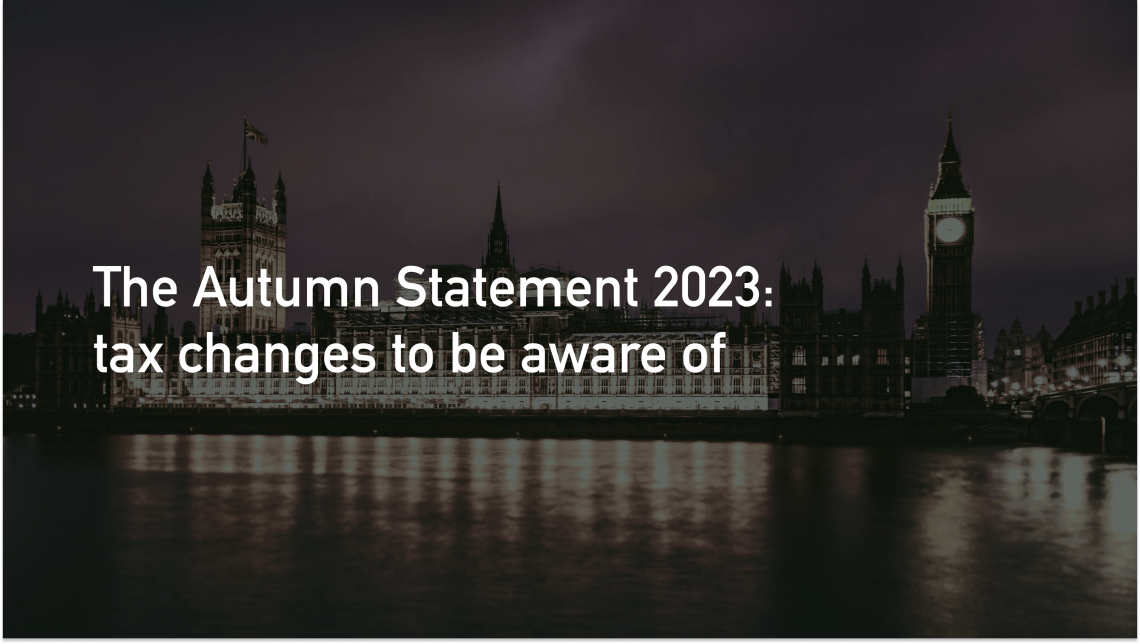
Today the Chancellor announced the Autumn Statement and there are some milestone tax changes to be aware of.
Overall, there is some good news for individuals and businesses alike. However, the mission of today’s Statement was to take decisions for the long term and a lot of the measures introduced are tactical moves ahead of elections next year.
Here are some of our key takeaways:
Toby Ryland, Corporate Tax Partner, comments:
“Businesses across the UK will be celebrating today – finally a simple tax policy from the Chancellor!
“Full Expensing is a straightforward and easy tax relief that will make the decision to invest in new equipment much easier. It covers a wide variety of business necessities, from IT infrastructure, office furniture, certain commercial vehicles, warehouse and construction equipment, as well as fixtures for non-residential properties.
“It means that tax deductions will follow the financial cost of investing in real time rather than spreading the cost over a longer period. It’s simple to administer too – companies can claim the relief through their Corporation Tax return.
“For example, if a business spends £100 on new tools and machinery, it will get a tax deduction for the full £100 immediately. Prior to the Full Expensing rules, the company would need to have claimed capital allowances on the £100, and while they would have still got the full tax relief, it would be over a much longer period of time, in this case, at a rate of 18% per year.
“Arguably a tactical and political decision ahead of 2024 elections, but a positive announcement nonetheless from the Chancellor. This will help to bolster UK business and bring back British entrepreneurial spirit. This is a step in the right direction to put the UK back on the map as a go-to destination to do business in.”
Sam Dewes, Private Client Partner, comments:
“Tax cuts have been a long time coming! It’s been a tough few years and many people across the UK are worse off due to thresholds being frozen, so many will be pleased to see a small increase to their take home pay from January, with middle earners benefiting the most.
“The Chancellor’s decision to scrap Class 2 National Insurance contributions will provide some good news for the self-employed, although the reality is that it will amount to a fairly modest saving. They will now only have to pay Class 4 National Insurance contributions at a new reduced rate of 8%. This is a fair reward for the UK’s entrepreneurs and traders taking the risk of running their own business.
“There has been no indication of a reduction in the National Insurance paid by Employers which would have been welcomed by job creators who have continued pressure on their payrolls from wage inflation.
“Those that rely on passive incomes, such as landlords, have also missed out today on the NIC reductions. It also won’t help those who are NIC exempt such as pensioners, although the Chancellor has announced that they will honour the triple lock state pensions, meaning an 8.5% increase from April 2024.”
Gerry Myton, Head of Indirect Tax, adds:
“There will be lots of celebrations today for UK hospitality. The Chancellor has finally raised spirits with his decision to freeze duty across all alcoholic beverages, however cheaper pints don’t solve everything! The industry was preparing to be hit by a £864m business rates bill in 2024 and the decision to extend the 75% discount for retail and hospitality businesses is a significant step up in terms of support.”
If you would like to discuss what these changes mean for your personal circumstances, please get in touch with us directly.
We’d love to hear from you. To book an appointment or to find out more about our services: